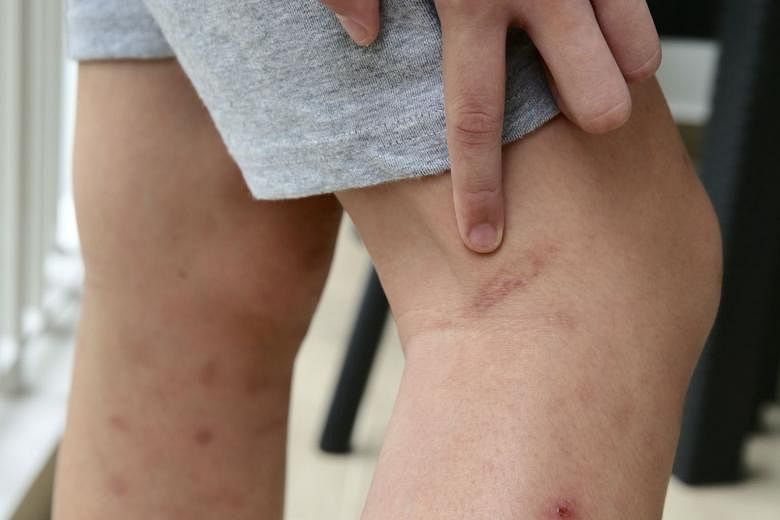A housewife has lodged a police report after discovering cane marks on her Primary 6 son's arms and legs, scars allegedly inflicted by his school's discipline headmistress.
The police said they received the report at 11am on Tuesday, the day the boy was caned in his primary school in the north-eastern part of Singapore, and are investigating it as a case of voluntarily causing hurt.
Ms Claire Kang, 48, the mother of the pupil, told The Straits Times that the school's discipline headmistress caned her son and a classmate without informing the boys' parents.
Ms Kang said the headmistress was dealing with an earlier altercation between her son and his classmate, and had summoned the boys to a school conference room where she chastised and caned them.
She added that her son had cried after the caning. "The police requested my son to demonstrate how he was being caned... He is traumatised by the caning incident and is unwilling to go to school."
The school said yesterday that it was unable to comment as the incident is under police investigation.
The Education (Schools) Regulations, under the Education Act, accessible on the Attorney-General's Chambers (AGC) site, said: "The corporal punishment of boy pupils shall be administered with a light cane on the palms of the hands or on the buttocks over the clothing. No other form of corporal punishment shall be administered to boy pupils.
"Where there is more than one teacher in a school, corporal punishment shall be inflicted by the principal only or under his express authority."
These apply to any government school, as well as any junior college and centralised institute providing pre-university education.
The Ministry of Education (MOE) said it was informed of the incident on Wednesday. A spokesman declined to comment on the specific complaint, but said the ministry provides guidelines to schools to formulate their discipline policies and discipline in schools should be "an educative process".
According to an article on MOE's online publication Schoolbag.sg, caning "is considered only for severe and repeated offences, and after all other options have been exhausted".
Offenders are always warned in advance that certain actions of theirs could lead to caning and parents are always informed in advance if it is meted out to their child, the website added. Such punishment is typically accompanied by counselling and follow-up guidance for the student caned.
The MOE spokesman said: "In deciding the best approach, schools will consider the circumstances of the case, including the age of the student, severity of the student's actions and whether offences have been repeated."
Lawyer Josephus Tan of Invictus Law Corporation said that, looking at the regulations in the Education Act, "the devil is in the details".
"As injuries were documented on the arms and legs, which are not the stipulated areas, this can fall under Section 323 of the Penal Code (voluntarily causing hurt) or voluntarily causing hurt with a weapon, if the cane can be constituted as a weapon," he explained.
"It's up to the discretion of the AGC, but it could be a criminal case based on the wording of the regulations," he added.
Some parents, however, are in support of caning. The Straits Times reported recently that nearly 80 per cent of parents in Singapore had carried out corporal punishment at home, according to a survey of 600 parents by international research agency YouGov.
While 37 per cent said corporal punishment in schools should be banned, 35 per cent felt it was acceptable. The rest were undecided.
Insights Mind Centre psychologist Daniel Koh said any form of punishment that inflicts emotional distress and has long-term effects on the child's self-worth should not be carried out.
He added: "Helping a student should not be a blaming game to the child, parents or school. It should be a team effort to work on how to help everyone achieve the goal and complement one another's strengths."

